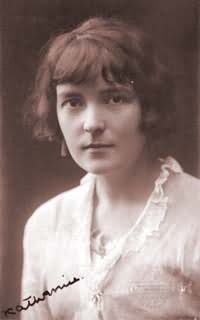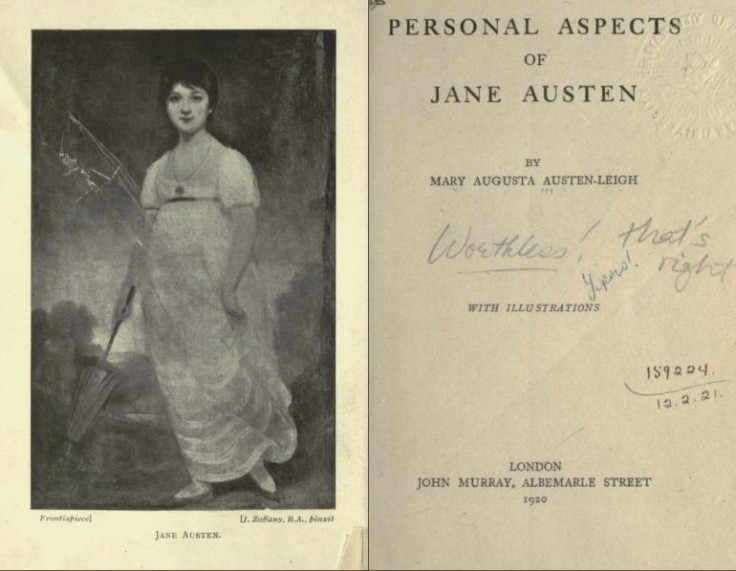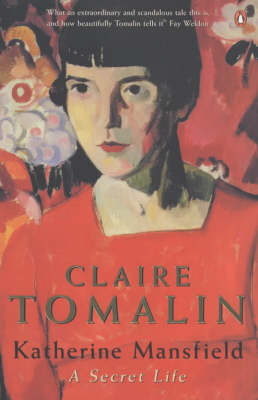 Was Jane Austen a Moralist? No! many of her fervent admirers will exclaim – ‘Thank Heaven – that she was not!’ Her mission was to amuse, to delight, to refresh us – but neither to reprove nor to condemn us! Those who want ‘Moral Tales’ must seek them elsewhere; they are not to be found among Jane Austen’s writings! Mary Augusta Austen-Leigh, Personal Aspects of Jane Austen, Chapter 5
Was Jane Austen a Moralist? No! many of her fervent admirers will exclaim – ‘Thank Heaven – that she was not!’ Her mission was to amuse, to delight, to refresh us – but neither to reprove nor to condemn us! Those who want ‘Moral Tales’ must seek them elsewhere; they are not to be found among Jane Austen’s writings! Mary Augusta Austen-Leigh, Personal Aspects of Jane Austen, Chapter 5 Kathleen Mansfield Murry (1888 – 1923) was a prominent New Zealand modernist writer of short fiction who wrote under the pen name of Katherine Mansfield. Her review of Personal Aspects of Jane Austen by Mary Austen-Leigh, was first published in the periodical The Athenaeum on December 3, 1920, and reprinted in the book Novels and Novelists, edited by her husband John Middleton Murry posthumously 1930. I was fortunate to find this except in my 1982 copy of Persuasions, the Journal of the Jane Austen Society of North America.
Kathleen Mansfield Murry (1888 – 1923) was a prominent New Zealand modernist writer of short fiction who wrote under the pen name of Katherine Mansfield. Her review of Personal Aspects of Jane Austen by Mary Austen-Leigh, was first published in the periodical The Athenaeum on December 3, 1920, and reprinted in the book Novels and Novelists, edited by her husband John Middleton Murry posthumously 1930. I was fortunate to find this except in my 1982 copy of Persuasions, the Journal of the Jane Austen Society of North America.
It seems almost unkind to criticize a little book which has thrown on bonnet and shawl and tipped across the fields of criticism at so round a pace to defend its dear Jane Austen. But even with the undesirable evidence before us of the stupidity, nay, the downright wickedness of certain reviewers, we cannot help doubting the need for such a journey. True, Jane Austen exists in the imagination as a writer who has remained wonderfully remote and apart and free from the flying burrs of this work-a-day world, and it does come as a surprise to learn that so-called friends of hers have said these dreadful things. But, begging Miss Austen-Leigh’s pardon – who cares? Can we picture Jane Austen caring – except in a delightfully wicked way which we are sure the author of this book would not allow – that people said she was no lady, was not found of children, hated animals, did not care a pin for the poor, could not have written about foreign parts if she tried, had no idea how a fox was killed, but rather thought it ran up a tree and hissed at the hound at the last – was, in short, cold, coarse, practically illiterate and without morality. Mightn’t her reply have been, ‘Ah, but what about my novels?’ Though the answer would seem to us more than sufficient, it would not satisfy Miss Austen-Leigh…
Each of these charges can be met – and they are met, though, to be quite candid, it is somewhat quaintly at times. Take, for instance, the ‘baseless accusation that she always turned away from whatever was sad.’ It cannot, says Miss Austen-Leigh, be allowed to pass unnoticed. And she cites a family letter written by Mr. Austen on the occasion of a young friend’s having been invited to their house to have her attack of measles there: ‘She wanted a great deal of nursing, and a great deal of nursing she had,’ the nurses being Jane, her sister Cassandra and their friend Martha Lloyd. Well, that may go to prove that Jane was willing to face an unpleasant ordeal and to play her part, but we should not like our belief in her tenderness to depend on it. Does it not sound just a little grim? Might not a timid mind picture patient and pillows being shaken together; and, as to escaping one’s medicine, Cassandra and Martha to hold one down, and Jane to administer something awfully black in a spoon? The, again, someone having said that sermons were wearisome to her, Miss Austen-Leigh contradicts him triumphantly with Jane Austen’s own words, ‘I am very fond of Sherlock’s Sermons, and prefer them to almost any.’ But stare at that sentence as we may, we cannot see an enthusiasm for sermons shining through it. It sounds indeed as though Sherlock’s Sermons were a special kind of biscuit – clerical Bath Olivers – oval and crisp and dry…
[‘Ah, but what about my novels?’]
…For the truth is that every true admirer of the novels cherishes the happy thought that he alone – reading between the lines – has become the secret friends of their author.
Virginia Woolf had pretty much the same thing to say in response to the book, which leads me to believe that they influenced each other.
Ever since Jane Austen became famous they [critics] have been hissing inanities in chorus …. [D]ebating whether she was a lady, whether she told the truth, whether she could read, and whether she had personal experience of hunting a fox is positively upsetting. We remember that Jane Austen wrote novels. It might be worth while for her critics to read them.
Even though I agree with Mansfield and Woolf, ‘Who cares? – What about my novels?‘ we should be thankful that Miss Austen-Leigh got up on her soapbox and passionately defended her ancestor. In addition to her denunciation of Austen’s critics, she actually revealed some new information not previously included in other family biographies. I do confess to cringing when I read the introduction and came upon her statement that Jane Austen died in her forty-second year. Ok, I’m not good at math either.

The biography is a quick read at 129 pages and happily available online through Canadian Libraries Internet Archive. Go to the ‘View Book’ on the left sidebar and then check out the “Flip Book” reader. Quite impressive software that I wish Google Books would adapt. Just to be contentious, I could not pass up including the title page for your amusement. Notice the comments by previous readers scribbled near the center of the page! They are tough critics those Canadians, and great Austen scholars I might add. I would not have been so severe on poor Miss Austen-Leigh. She was just defending her turf. Flip through the pages and you will notice additional marginal notes which I always feel are a bonus. This was timely for me as Janeite Deb of Jane Austen in Vermont Blog and I were just chatting about marking up good books with marginal notes and underlining. I know it is a personal thing, but books are so sacred to me that I just can not do it. Though, I confess I encourage others to leave their brilliant thoughts for posterity. Jane Austen did, and people are still talking about it!
 And finally, the last serendipitous connection to this post is with Jane Austen’s biographer Claire Tomalin who wrote Jane Austen: A Life. She also wrote a biography of Katherine Mansfield. Now that I know Mansfield is a friend of Jane, and Tomalin thinks highly enough of her to write a biography, it is worth a gander.
And finally, the last serendipitous connection to this post is with Jane Austen’s biographer Claire Tomalin who wrote Jane Austen: A Life. She also wrote a biography of Katherine Mansfield. Now that I know Mansfield is a friend of Jane, and Tomalin thinks highly enough of her to write a biography, it is worth a gander.
1. Southam, B.C. (editor) Jane Austen, Volume 2, 1870-1940 The Critical Heritage, Published by Routledge, (1999) Introduction pp. 96-97
Such an interesting post! I love the portrait of Mary Augusta Austen Leigh.
LikeLike
I thoroughly enjoyed this article. Well researched and highly informational, love the images. I can’t get enough information about Jane–good trait or bad, just makes me want to know more.
LikeLike
I also thoroughly enjoyed your review of “Personal Aspects of Jane Austen” and Mansfield’s and Woolf’s responses to the criticism it received. Also, thanks for the link to the online version–I will definitely want to read this one.
LikeLike
Miss Kathleen sounds like a trip. I drummed-out a quick google search, but failed to find any of her stories in full-text (for free). Too bad. I think she would be a thrill to read.
LikeLike
We remember that Jane Austen wrote novels. It might be worth while for her critics to read them.
This is quotation is made of awesome and I plan to use it at every opportunity.
LikeLike
S., Michael: Several of Katherine Mansfield’s books are available at Gutenberg.org:
http://www.gutenberg.org/browse/authors/m#a631
LikeLike